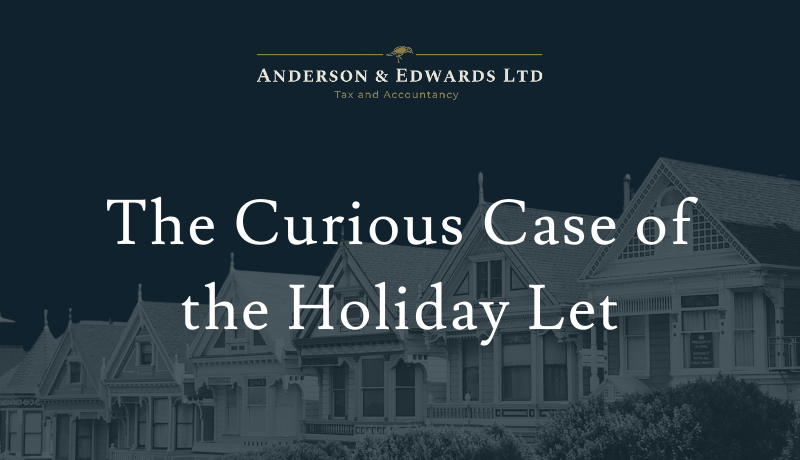
The rise of “staycations” has been hard to miss. Rural beauty spots have seen a major increase in activity over the last 18 months, I (James) have even heard rumours of 45-minute queues at the top of Mount Snowdon (or Yr Wyddfa, if you ask my dad).
People need places to stay, and many people make use of holiday let accommodation.
Positive as the revenue stream from holiday lets may seem, there is a lot of misinformation about the tax treatment of these properties. The tax treatment could be considered ‘good’, but not nearly as ‘good’ as some people will have you believe.
Here are three potential pitfalls covering three different taxes affecting these types of businesses:
· Capital Allowance Balancing Charges if the business finishes or changes
· Business Assets Disposal Relief (formally Entrepreneurs Relief) on the sale
· Business Property Relief (Inheritance Tax Exemption)
First, let’s define the business type I am referring to - Furnished Holiday Lets (FHL). These are nice and easy to define as they have specific rules stipulating what they are.
· It must be within the UK or the European Economic Area (EEA)
· It must have furniture for ‘normal occupation’ and the tenants must be entitled to use it
· The letting of the property should be carried out commercially with a view to profit
· Three occupation requirements must be met as follows:
o Available to let for at least 210 days in the tax year
o Must be let for 105 days in the tax year
o Guests staying for more than 31 days do not count to the 105 total, and if someone stays more than 155 days, the property does not qualify as an FHL
This means that you cannot qualify as an FHL “for the summer” and have a long-term tenant for the rest of the year.
An FHL can claim a lot more expenditure against the income received from the property, including some of the costs involved in the purchase of the property.
This means that it can normally take a few years before any income tax is payable on the profits received from renting.
However, if the business ceases, or changes to a ‘long let’, then there is a good chance that you will need to pay a balancing charge as part of your rental income. Capital Allowances are not often well understood by non-tax specialists. HMRC may decide to target this area in the coming years as the 2020/21 tax returns are submitted. Therefore it’s key to ensure you speak to a tax specialist.
This is a biggie.
FHLs typically qualify for a 10% rate on Capital Gains tax. However, it is important to understand when it does not.
The relief is not available when you only sell an asset of the business. The whole business or a specific part of the business needs to be sold. This is best explained with an example:
Imagine an individual had a plot of land with two cottages on it. Both cottages qualified as FHLs. If both cottages were advertised on a single website, and bookings were taken on the same system, then selling one cottage would be considered as selling ‘an asset of the overall business’ not selling ‘a part of the business’. It will depend on the facts of each case for whether the 10% rate is applicable.
The most significant tax relief on FHL properties is usually from Inheritance Tax. However, HMRC’s opinion is that FHLs do not obtain IHT relief, and they seem to be winning most of their cases in the courts.
For a Furnished Holiday Letting to qualify as relevant business property for Business Property Relief (BPR), the below must apply:
· There must be a business carried on - usually not a problem
· It must be carried on for a gain - usually not a problem
· It must not be a business consisting wholly or mainly of “holding investments” (section 105 IHTA 1984) - a potential problem
Holding a property for ordinary rental is regarded as holding an investment, therefore there is a requirement to evidence business activities of significant scale to show that the business is not an ‘investment business’.
Simply holding the property and renting it out is not enough in HMRC’s view. This is backed up in case law.
There was a recent case up here in Scotland, Cox (Executors) v HMRC 2020 UKFTT 442 TC. Business Property Relief was denied and £224,816 of tax was deemed as payable.
The case that most people cite, (Scilly Isles) Grace Joyce Graham (deceased) v HMRC [2018] UKFTT 0306 (TC), is the one where Business Property Relief was granted and the taxpayer won.
However, the Graham case was rather exceptional. The level of additional services and attention from the people in the business was far beyond that of a normal FHL. Amongst other things, each guest had a 30-minute meet and greet with the owner over tea and coffee upon arrival.
A locked box and a welcome email to each guest will not be enough!
If you are involved in a Furnished Holiday Let business or are unsure about your tax implications, we would always recommend speaking with a Chartered Tax Advisor. Even if it isn’t us, we’ll try to point you in the right direction.
Get in touch with our Tax Director and Chartered Tax Advisor James Edwards MA ATT CTA or find out more about us.
© 2025 Anderson & Edwards Ltd|Registered in Scotland SC678768|Privacy Policy|Website by Broxden